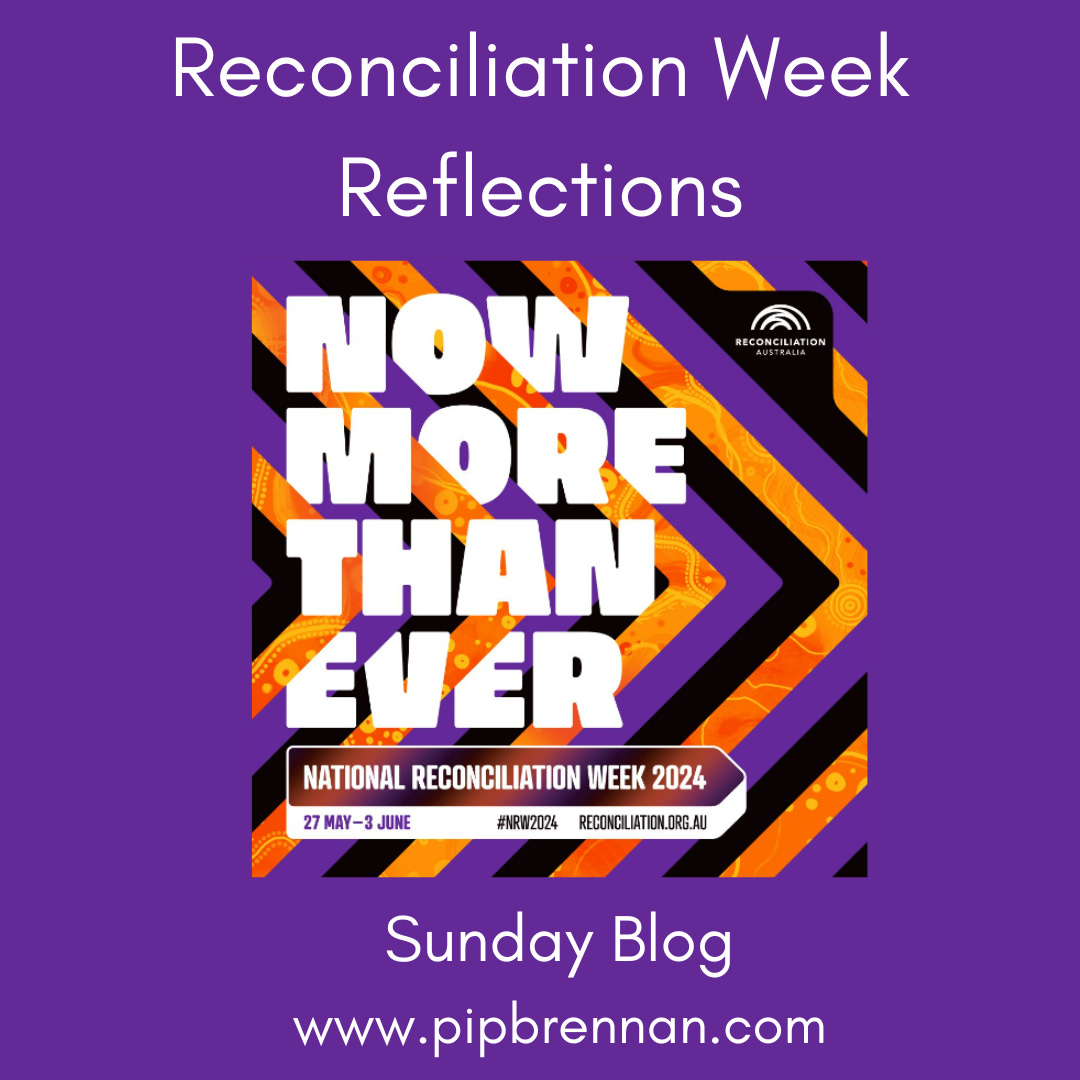Reconcilation Week Reflections
Sunday Blog 138 - 2nd June 2024
This week has been a bumpy landing, after two glorious weeks in the Katharine Susannah Prichard Writers Centre. Emerging from this special cocoon of creativity and being removed from day to day activities has been hard.
No. Writing. At. All. From Monday to Friday. Monday was my birthday but I had to work all, all day. Same deal for each of the other days in the week. It’s like the everyday reality had been pushed back like an elastic band, and this week it pinged back and stung me. I even fought with my darling husband and maintained a frosty silence for a night and a day.
This actually passed relatively quickly, but how much had my frustration at not being able to write contributed to the fight? Sigh.
Monday was my 59th birthday. I think that this has to be the countdown of one year until I say no to work, unless it’s writing.
Another important event this week is Reconciliation Week, which runs from my birthday until tomorrow, 3rd June. It got me reflecting, and became my Sunday blog. It came to me whole, early in the week, then I lost it in the fog of work. On Friday I went to the yoga mat, trying not to feel forlorn at the missing blog and then whoosh. As I was moving through the routine it came back to me.
And now I’m sending it on to you.
Hope your Sunday is going magically.
Sunday Blog 138 - 2nd June 2024
This Reconciliation Week got me thinking about a conversation I had a few years ago.
“I’ve experienced positive discrimination.” I said to an Aboriginal colleague. Positive discrimination, the white, middle-class privileged water that I swim in, and so often forget. I was thinking about a few times when the positive treatment I received was so glaringly obvious that I noticed.
“Positive discrimination. I’ve never experienced that. What’s that like?” She was genuinely curious about my answer.
Here are several I remember.
-Arriving in London in 1990, the fumes of Heathrow still on me, visiting an Abbey National bank with my pound coin to open up a bank account. I needed it so I could get paid when I started temp work. Two young men of colour in the queue behind me, also with the fumes of Heathrow coming from their backpacks and jackets, tried the same conjuring trick. A gold coin to create a mechanism to receive a salary. Only they were declined. I said nothing and slunk away.
-Moving to Thessaloniki in Greece to teach English as a Foreign Language. We needed our passports validated at the Alien Department (that’s pretty much a direct translation from the Greek) and we were hustled to the front of the queue. Past everyone that had been waiting for hours, people from neighbouring countries such as Albania, Bulgaria, perhaps further afield. We were in and out within minutes. As a slightly more mature person, I said “sorry” to each person as I passed them.
-Becoming the victim of a serious crime in Perth and experiencing the privilege of being “the credible witness” from the moment of reporting to the police, all the way through to a significant sentence being imposed. The police officers who had been part of the investigation even went along to the sentencing (which was more than I did). Soon I was invited onto advisory committees to talk about the victim's experience and how things could be done better.
Once I took part in a workshop activity designed to bring positive discrimination to the fore. We all lined up at the back of the room. Each of us had a piece of paper which told a few details about our lives. Where we were born, the colour of our skin, the level of poverty and trauma we experienced as children, the education level we’d attained. We were asked to take one step forward if we had graduated from high school. Or if we’d experienced a peaceful home life as children. And on and on. Some people were already at the end of the room before others could take one step forward.
At the end of the Walk for Reconciliation held in Boorloo (Perth) on Friday, we gathered around a stage where the facilitator spoke to the crowds. She asked the children, who were all sitting cross-legged on the mat in front of the stage, to stand up. She asked them to turn around and look at us. Several dozen faces looked at us — Aboriginal and Wadjella (non-Aboriginal) children. In their gaze, I felt the punch to my heart, the tears push at my eyes.
There was so much hope and power as the children gazed at us. Our children have been educated about the horrors of colonisation in Australia. They won’t, like me, be young adults before they first start to grapple with our history.
In the horrid ashes of the Yes vote debacle, when Australia slapped away the Indigenous hand of friendship, this Reconciliation Week march was a balm to my soul. Now, more than ever.



